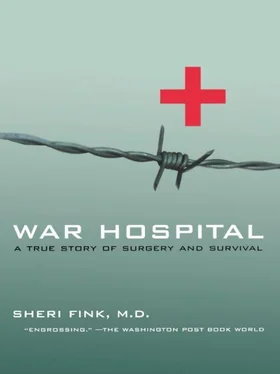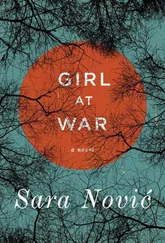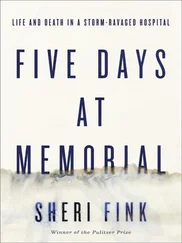Ejub took Mubina and Denis to the small, concrete Srebrenica bus station. Dozens of people scurried between the station and its curved driveway, adding to the air of chaos and panic. Mubina and Denis boarded a bus for Bosnia’s second largest city, Tuzla, where Ejub had a few family members. Ejub counted out the expensive fare in Yugoslav dinars, handing it to the conductor.
He stood outside and looked at Mubina through the windows. Tears fell down her round cheeks. Little Denis did not cry. Perhaps he was too young to understand. Ejub stared into Mubina’s eyes as the bus began to pull away. He started to wave. He waved and waved until the sight of the bus dangled at the edge of his vision and then slipped entirely away, untying their fates.
Ejub stayed at the bus station to smoke a few cigarettes with a friend whose wife had also left, and then he went home to sleep. Loneliness overcame him. Two days later, April 17, 1992, he went to spend the night at his best friend’s house in Potočari.
Sometime in the night, the sound of explosions and his friend yelling, “Get up! Get up!” awakened him. He scrambled around the house, looking for a safe spot to hide. Artillery fire seemed to be coming from the mountain above. The two men created a kind of bunker inside the house by piling rocks left over from a construction project.
Hands trembling, they smoked cigarette after cigarette, not even finishing one before stubbing it out and lighting another. By the end of the morning, dozens of half-smoked butts lay wasted on the floor like dead bodies strewn across a battlefield.
THE AFTERNOON OF APRIL 17, Dr. Ilijaz Pilav, the skinny general practitioner whose father was ailing in his birth village of Gladovići, waited in vain at the empty health center for his replacement. With no patients to treat and no way to reach his girlfriend, Fatima, he’d had little to do but wander outside and scan Srebrenica for activity. He caught sight of two men in military uniforms as they disappeared between houses across the street. He watched buses packed with nervous faces rumble out of town, and this at last forced a question: “What am I still doing here?”
But what choices did he have? The rumors that Vojislav šešelj’s Serb paramilitary had entered Bratunac convinced him not to go back home, not even to find Fatima and warn her to escape. He heard about a bus leaving late in the afternoon and heading southeast on the main road that ran out of Srebrenica. Afraid this bus would be the last, he took it toward his family’s village.
The next morning, April 18, he awoke to snow. He stood at the window of his parents’ house and watched the flakes blanket the ground and build up a pillow that smothered the buds on the tree branches. It seemed as if all the snow that ever existed was falling on the village. He felt paralyzed—cut off from the world.
For days he rested quietly in Gladovići, believing “the stupidity” would last at most one month. Then he heard that other Serbian paramilitary forces led by Željko Ražnjatović, “Arkan,” famous for his brutality in Croatia, had occupied Srebrenica. Ilijaz heard they were killing people and looting and burning houses. Maybe the stupidity would last much longer than one month. He grew impatient to organize some response.
But the old-timers in Gladovići urged calm.
We’ve seen war in these parts before, they said. Many an army passed through here during World War II, and only one village was burned. Keep quiet. They will leave us alone.
In the mornings, Ilijaz and a few friends hiked up the nearby hill, Kalina, to give themselves a view of the single paved road that wound southeast from Srebrenica toward the Bosnian border town of Skelani and ultimately across a bridge to Serbia. From the hilltop, they watched Serb military patrols pass back and forth and saw tendrils of smoke—first white, then dark—rise and bloom like flowers over the graves of Bosnian Muslim villages to the southeast. They witnessed lines of villagers stumbling into Gladovići, bent beneath hastily packed bundles of possessions, searching for refuge from the Serb nationalist soldiers they called Chetniks.
In the village, Ilijaz’s profession gave him an inherent authority. People trusted him. They asked for his help and advice. Feeling he should make use of his influence, he began to organize a defense. To evade the scrutiny of the pacifist village elders, he recruited men with whispers and met with them by night.
If this was war, Ilijaz thought, that implied there were two armies—not just one. If a center of resistance existed nearby, Ilijaz guessed it would be in Osmaće, population 1,000, the biggest village in the area with the most police reserve weapons and, according to rumor, the bravest men. The Muslim village had “resisted” both Serb nationalist Chetniks and Yugoslav Partisans during World War II and was said to have continued fighting after Berlin surrendered. Ilijaz sent runners to check if Osmaće had organized a defensive force. They returned with disappointing news. The men of Osmaće were no more organized than the men of Gladovići.
On May 6, Ilijaz climbed Kalina hill with several of his neighbors. They looked down and watched a military truck moving slowly along the Srebrenica-Skelani road. The idea of ambushing enemy vehicles had tantalized the men for days. Using the element of surprise to their advantage—that was a way the weak could fight the strong. Standing on the hilltop with Ilijaz, the sight of the truck so excited one of the men that he agitated for an immediate attack. That would be suicidal, Ilijaz told him.
But an ambush would indeed show the Chetniks that the villagers planned to stand their ground and resist attack. Perhaps the villagers could even manage to capture a few automatic weapons to add to their pitiful arsenal of old hunting rifles.
The men schemed and plotted and planned for an action the following day. Then Ilijaz returned to his family in Gladovići. He could have sworn his brother, Hamid, was eyeing him suspiciously. Never mind. Ilijaz would keep his military plans a secret. He wouldn’t expose Hamid—ten years older, with a wife and family—to danger.
That night he lay in bed, unable to sleep. At 3 A.M. he rose as planned and stepped into a black jogging suit. To avoid waking his family, he crept down the hallway in the dark. But there, startling him at the doorway, stood his ill father.
“Good luck, son,” was all he said.
Around fifteen young men from Gladovići gathered in a thin copse of trees near the main road. They included Ilijaz’s cousin—a medical technician named Sulejman Pilav—and Ilijaz’s good friend and neighbor šefik Mandžic, a kind, confident man in his late twenties who specialized in constructing minarets.
Ilijaz might have been a doctor, but this morning the equipment he carried with him to work was a “Kragljevska” automatic gun given to him by a former policeman. He took a certain pride in that, what with most of the others carrying hunting rifles or, at best, the ubiquitous Eastern European warhorse, the Kalashnikov. Ilijaz’s weapon had a longer range and was more likely, in the right hands, to hit its target.
Like so many military actions, this one was destined to enter history in many different versions. This much is clear: Ilijaz and his men set an ambush on the Srebrenica-Skelani road somewhere in the vicinity of Kalina. Others from neighboring villages, particularly Osmaće, organized attacks nearby.
The groups shot at trucks and they shot at cars, killing a number of Serbs. Ilijaz and his men insisted they killed only soldiers who returned fire—indeed two attackers from Osmaće also died. But Serbs in the area told a different story, that seven Serb civilians, including two women, were killed.
Читать дальше












